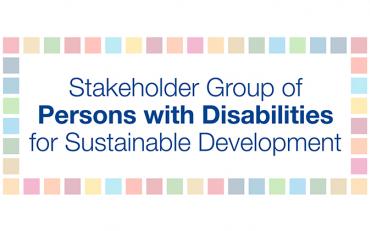On 8 July, the Stakeholder Group of Persons with Disabilities held its official side event at the 2020 High-level Political Forum. The event revolved around the question: Will the SDGs be Still Relevant After the Pandemic for Persons with Disabilities?, drawing from the article from the IISD SDG Knowledge Hub written by co-facilitators of the Stakeholder Group.
The event had a stellar group of panellists including representatives from underrepresented groups of persons with disabilities from around the world, global leaders of representative organizations of persons with disabilities, government representatives from Australia, Bangladesh, New Zealand, Jamaica and the United Kingdom, and civil society partners.
Background
Since the adoption of the UN Convention on the Rights of Persons with Disabilities (CRPD), followed by the adoption of the 2030 Agenda for Sustainable Development and its Sustainable Development Goals (SDGs), there has been positive development and change in the lives of persons with disabilities. Slowly societies have begun to transition from the traditional charity and medical model approaches to inclusion to a social and human rights approach granting persons with disabilities more rights than ever before.
The COVID-19 pandemic overwhelmingly has negatively impacted persons with disabilities in various ways. Historical inequalities have resurfaced, discrimination has increased and the push for inclusion has become more challenging. Dialogues on leaving no one behind, reaching the furthest behind first and inclusion in the pandemic world are largely being neglected or not a priority. This poses the fundamental question for persons with disabilities: is it still important to advocate to achieve the Sustainable Development Goals? Moreover, will the Goals and targets be instrumental to build a better, more inclusive and equal world for all?
Presentations focused on the following three main themes:
- The role of multilateralism and action-oriented political leadership to ensure that the response to the pandemic and the rebuilding of societies follow a rights-based approach and ensure the inclusion of persons with disabilities;
- Reducing inequalities, addressing discrimination and eliminating barriers through consultation and partnership in an intersectional approach including underrepresented groups; and
- The vital role and critical contribution of representative organizations of persons with disabilities in the pandemic response, highlighting that persons with disabilities must be active leaders and participants in all decision-making processes to build back a better for a more inclusive future for all.
You can read some compelling quotes from presenters on the situation of persons with disabilities in the pandemic here:
- Women with disabilities are two-to-three times more likely to experience violence than their peers without disabilities, Ally Tang, UK Mission to the United Nations
- Considering youth with disabilities make up about 12% of 1.8 billion young people in world, I have witnessed firsthand my friends with disabilities who lose their jobs and get caught up in domestic violence due to COVID-19, Yohana Kibe Mungai, Kenya
- As a woman with a psychosocial disability, the pandemic has affected me disproportionately more than a man with a disability, Dorothy Nakato Mubezi, Uganda
- Organizations of persons with disabilities quickly stepped in during the pandemic to address gaps in government services and became sources of information, raised awareness, provided accessible materials and distributed food and medicine to members, Dr. Vladimir Cuk, the International Disability Alliance
Recommendations from panellists on the way forward are below:
- Concrete actions need to be taken by governments to realize the Sustainable Development Goals, Juan Angel de Gouveia, RIADIS
- People who don't communicate in traditional ways often have the most to say, so if we want to achieve the SDGs, we must ensure their voices are heard, Fernanda Santana, Brazilian Association for Action in Rights of Autistic Peoples
- We need a rights-based approach, universal design and investment in persons with disabilities and their capacity to achieve the SDGs and build a better world, Dr. Mary Keogh, CBM Global
- The SDGs are and will remain a critical framework in achieving the rights of persons with disabilities, but also require ongoing and greater concrete actions by governments and increased participation of organizations of persons with disabilities so the dream becomes a reality, Dominic Haslam, International Disability and Development Consortium.
In closing, in case you missed the event, you can click here for the recording of the event and here for additional information about the event.

